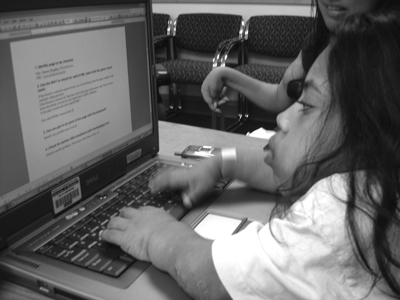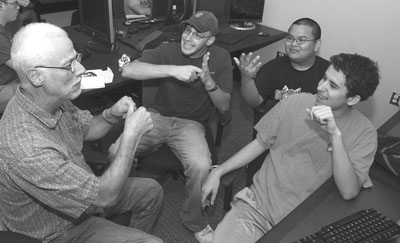Video Content and Universal Design
It is easier than ever to produce and distribute video content via DVD or the web. As an educator, how do you ensure that the videos you create are accessible to all students?
It is easier than ever to produce and distribute video content via DVD or the web. As an educator, how do you ensure that the videos you create are accessible to all students?
AccessComputing staff and participants developed an Accessibility Checklist to guide faculty and administrators in making their computing departments more accessible. The checklist is based on the concept of universal design, defined by Ron Mace of the Center for Universal Design as, "the design of products and environments to be usable by all people, to the greatest extent possible, without the need for adaptation or specialized design."
 The online AccessComputing Knowledge Base was developed for computing students with disabilities, faculty, and professionals. Its goal is to make academic programs and careers in computing fields welcoming and accessible to individuals with disabilities.
The online AccessComputing Knowledge Base was developed for computing students with disabilities, faculty, and professionals. Its goal is to make academic programs and careers in computing fields welcoming and accessible to individuals with disabilities.
The UW hosted the AccessComputing Leadership Institute in Seattle in fall 2008. The event brought together more than twenty-five leaders from around the country to broaden participation in computing for people with disabilities. The goals of the institute were threefold:
Since February 2006, AccessComputing has contributed funds to support computing-related activities, training, and experiential learning opportunities nationwide. Individuals can seek funding to support
The UW Department of Computer Science & Engineering's WebAnywhere project was a recipient of the Andrew W. Mellon Foundation Award for Technology Collaboration (MATC). As Vint Cerf presented the award at the Coalition for Networked Information fall meeting he stated,
Richard Ladner, UW Department of Computer Science & Engineering professor and AccessComputing Co-Director, was one of fifteen recipients of the 2008 Purpose Prize, an award for social innovators over sixty years of age. Ladner has shifted the focus of his research from computer science theory to developing better technologies for people with disabilities.
 Advancing Deaf and Hard of Hearing in Computing (ADHHC) is an AccessComputing project that was developed to increase the participation of individuals who are deaf or hard of hearing in computing fields. The ADHHC website is a great place for students and practitioners alike to find new resources and opportunities. Visitors can discover
Advancing Deaf and Hard of Hearing in Computing (ADHHC) is an AccessComputing project that was developed to increase the participation of individuals who are deaf or hard of hearing in computing fields. The ADHHC website is a great place for students and practitioners alike to find new resources and opportunities. Visitors can discover
This past summer, Anna Cavender, Lindsay Yazzolino, and I led thirty blind youth ages eight to twelve in two different Computer Science Unplugged activities. The Computer Science Unplugged program introduces youth to computing concepts without the use of computers. One group of fifteen students learned about sorting in a hands-on activity using different algorithms, including insertion sort, selection sort, and bubble sort. They sorted themselves by first name, birthday, and length of cane using the different algorithms.
In the fall of 2008, Professor Harry Lang from the National Technical Institute for the Deaf at Rochester Institute of Technology delivered a lecture titled "The Genius of Community: Technology as Friend and Foe in the Lives of Deaf People" to an audience of 150 people at the UW. In his lecture, Lang traced the invention of the teletypewriter (TTY) to a small group of determined deaf people who wanted to access the telephone in the 1960s.